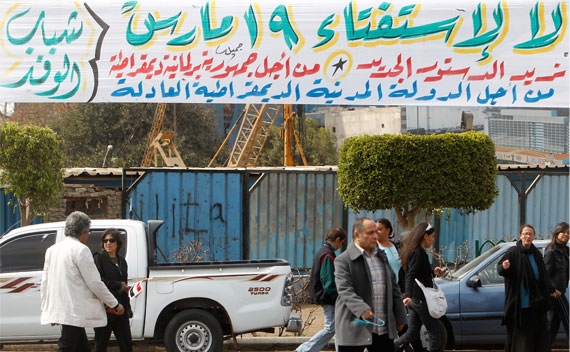Egypt’s Referendum
More on:

Tomorrow is referendum day in Egypt. The first step in building a new and hopefully decent political order where rule of law (as opposed to rule by law), human rights, transparency, pluralism, and accountability prevail. The package of constitutional amendments on which Egyptians will be voting yes or no promises to limit presidential terms in office, levels the playing field for those who want to run for president, strengthens the independence of the judiciary, abolishes important aspects of the emergency law that was written into the constitution in 2007, and gives parliament control over that law. These are all important changes that many hope will set Egypt on a democratic trajectory. Still, if I were Egyptian, I would reject the amendments.
It’s not just that the constitutional changes do nothing to alter the overwhelming power of the executive, fail to deal with basic legal issues like due process, and neglect to address various other authoritarian aspects of the state, but it is all these things combined with a political process that is on fast forward that can compromise a democratic transition. What Egypt needs more than anything else is an entirely new constitution, not piecemeal changes that provide opportunity for counterrevolutionary and non-democratic forces to manipulate. Here’s my fear: Even though the Constitutional Committee inserted a provision in article 189 calling for the drafting of a new constitution within six months of the parliamentary election—to be held in June—the planned rapid pace of the handover to civilians favors groups whose democratic credentials are not above reproach. Can a parliament made up of remnants of the old regime, the Muslim Brotherhood, some “independent businessmen,” and possibly Nasserists be responsible for overseeing the drafting of a constitution that will make way for a pluralist and representative political system? I suppose it is possible, but I have my doubts.
To be sure, the alternative—writing a new constitution while the military remains in control—has its drawbacks. Yet the revolution retains an enormous amount of legitimacy that will likely diminish with time and the vicissitudes of Egyptian politics. Now is the time to act when revolutionary groups still have the ability to put the Supreme Council of the Armed Forces on the defensive and extract important concessions from the officers. This is not to say that the process will be easy or that non-democratic groups will not try to influence the process. Political institutions always emerge in the heat of political contestation and conflict. Saying no to the amendments is worth whatever the risks of immediate and hopefully momentary uncertainty and instability. In a counterintuitive way, the best chance that Egyptians may have to build a democratic order is to reject the amendments and get on with the real business of writing a constitution while revolutionary groups are at the height of their collective legitimacy.
More on:
 Online Store
Online Store